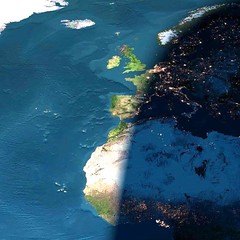Africa's Economic Emancipation
Africa's Economic Emancipation
The Post (Lusaka)
OPINIONSeptember 23, 2006 Posted to the web September 24, 2006
By Chishala Francis ChisembeLusaka
The question of Africa growing out of its poverty and realising the wealth of its numerous natural and human resources has always remained a source of nihilism and a cause for pessimism. These negative emotional and mental vibes are as a result of a growing mistrust in African governments that they are incapable of delivering. The common trend in African governments has been a lack of political will in transforming Africa's economy from international donor dependency to a locally driven and generated economy.
There are many vices that have gripped most African political leaders to such a po! int that they are incapacitated in distributing the nation cake equally with the ordinary citizens. Greed, corruption, nepotism and arrogance has led African leaders forget to plan and manage their economy and states. As a result of poor planning, African leaders have willingly danced to the tune of the international donor community and unwisely permitted both rich conglomerates and individuals with wealth to use the world's tax havens and banking systems to siphon sums of money out of Africa.
Africa having attained political emancipation in the last fifty years the expectations were that with this political emancipation economic autonomy would follow, a hope arched in Kwame Nkhruma's philosophy "seek ye first the political freedom and the other freedoms would be added unto you. What has gone wrong in Africa's journey towards a total economic emancipation? It is very important to ponder this question so as to gain insight into the conceptualisation and devising appropriate measures of charting a new path to Africa's economic liberation. Has political liberation failed Africa? Is democracy failing Africa? Then why is it that Africa still needs international donor aid, conditionality and neo-colonialism?
Given the good news of the Jubilee Debt Cancellation and Make Poverty History campaign having succeeded and more aid flowing, what is next in Africa's war of alleviating poverty as per millennium goals? The prophets of doom for Africa argue that even with debt cancellation and receiving aid from abroad, Africa will still remain underproverished. They would purport that continuous assistance to Africa, though well intentioned, will never solve Africa?s problems. They base their pessimism on the presumption that most of the aid given to Africa does not reach the intended beneficially as it ends up in the bureaucratic structures that are ill-functional and inefficient. Though most ?patriotic Africans' would not buy into this pessimism, to some extent it has a point that needs to be considered in order to raise the hope of a total economically liberated Africa.
Africa needs a vibrant civil service with a capacity to deliver. The civil service in Africa lacks the capacity to deliver the national resource and the international donor aid down to the very peasant in society. The civil service is poorly organised primarily because it is intertwined in nepotism at the expense of professionalism. This stultifies the civil service because you would not expect relatives of government officials heading a civil service to perform, though they could be exceptions if such are qualified.
African statesmen, from Nkwame Khruma to Thabo Mbeki and the NEPAD crew, have blown the horn for Africa taking responsibility of its own destiny. Without commitment to this challenge, even with a debt free and elimination of corruption, still Africa would fail to distribute its resources to the poor person. Botswana is isolated as a success story in having the capacity to distribute the benefits of its mineral resources to the very poor person in the rural areas. However, it could be asserted that the way forward for Africa is in political leaders having a political will in the process of developing its own political muscle. The idea is for Africa having to begin looking to itself in redressing and addressing its economic and developmental nightmares.
Some in the West have thought of another intervention, perhaps recolonising Africa with a project of redemarcating Africa's geographical and political boarders into states that have a reason to ethnically exist together. While this is an expression of independent and free thought, the idea is a joke, however it merits some serious thought on the future of Africa as it strikes a point that would make African leaders and intellectuals to start thinking. For instance, Africa needs a revolution in political leadership in order for its future to brighten. Watch out for Liberia's new President, Johnson Sirleaf (just thinking aloud) as an experienced economist, perhaps it is a pointer to a millennium package indicating a new leadership style capable of influencing and effe cting change.
The early 1990's witnessed the shift of African governments from one-party state to multi-party politics. This shifting to multi-party politics had introduced a new, three-tier democratic system that brought together politicians or governments, economic communities (investors) and civil society on the same table in the process of defining national development and interest, the Zambian and South African situation are success stories. The partnership of government, civil society and the economic community is perhaps a good starting point in Africas move towards taking full responsibility in managing its own political and economic affairs. The civil society, as it were, provides for the monitoring and enhancement of good governance. It is the responsibility of governments in Africa to engineer political and economical change; however, the civil society plays a major role especially in reaching the grassroots. What is required is for a commitment by government's in creating an enabling environment that would favour and promote local investments. The government?s role is to create policies that encourage the civil society partner with the economic community in empowering the masses. Through this partnership, the riches and national resources would be able to reach the common person at the bottom of society.
The question to be asked today is whether Africa, after the ushering in of democracy has continued to make progressive steps in the distribution of resources to all. Is there a sign that Africa would achieve economic liberation? With the three tier partnership the future of Africa is bright. Everywhere in Africa, countries have started addressing issues of corruption, though not with a desired speed. The consolation for Africa's success comes when history indicates that even the developed world took years to reach where they are at now. Africa has all the able resources, both natural and human, to mitigate its economic difficulties.What is required is the change of attitude and an assumption of a political aggressivity that would make the civil service to function with vibrancy.
The author is a Zambian Jesuit Scholastic and M.A. Media Studies student at the University of Cape Town
Copyright © 2006 The Post. All rights reserved.







